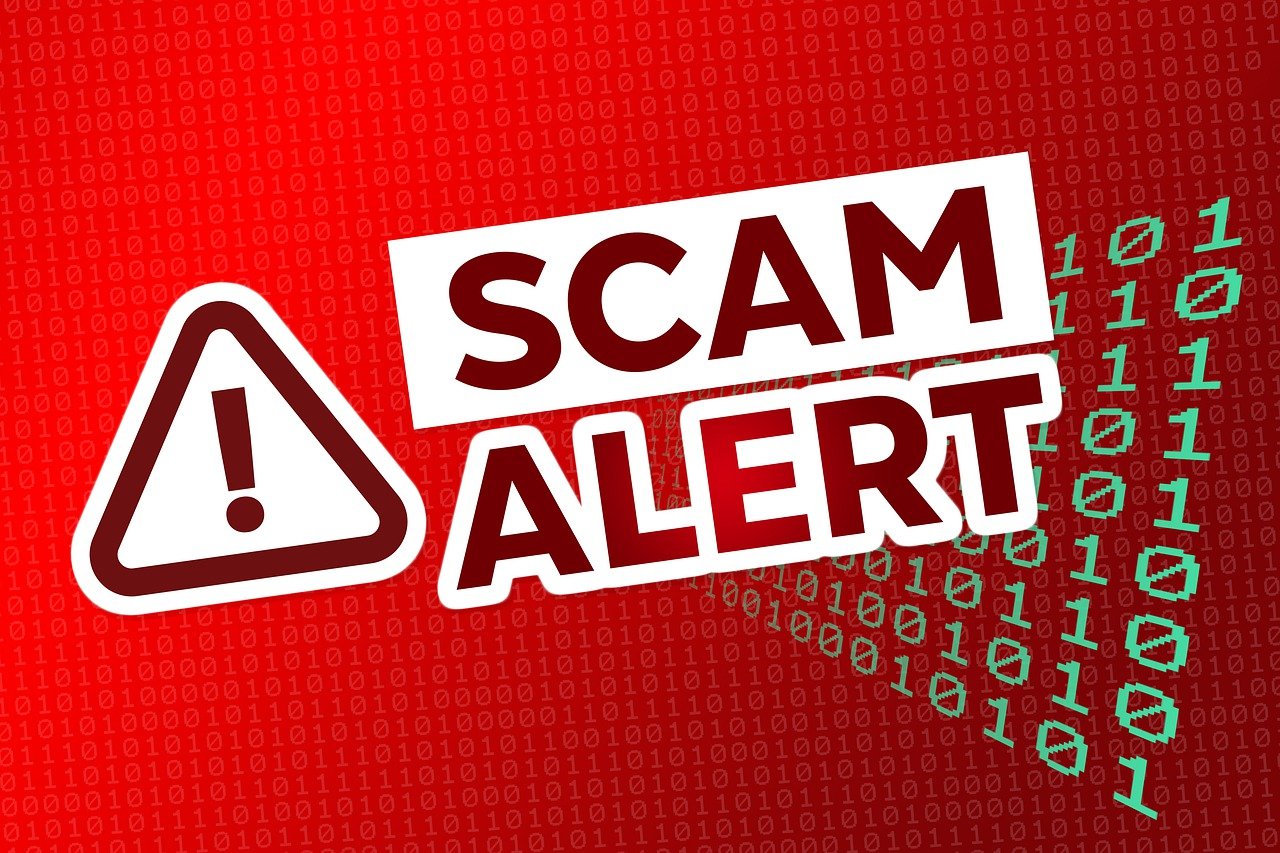Why we believe this site to be a scam:
https://blockdag.network
Please note that this scam warning is regarding the specific crypto project naming itself ‘BlockDAG Network’ and not BlockDAG technology in general.
We’ve recently been focusing our efforts researching new technology within crypto and one of those is BlockDAG (used by Taraxa and Kaspa). Both Taraxa and Kaspa are legitimate projects with working products and we have written articles about these.
BlockDAG is a different design of crypto architecture, an improvement to the drawbacks of Blockchain. Unfortunately, with any new and exciting technology, there are always malicious actors ready to take advantage of those trying to find new crypto projects using this new technology.
So let’s talk about a cryptocurrency that has named itself “BlockDAG”, which we have seen mentioned on multiple social media platforms and online news articles. It first appeared towards the end of 2023 and beginning of 2024. Based on what we have seen, we find this project highly suspicious and it is our opinion that is likely a very sophisicated scam or network of scammers. We hope this article helps you to understand how scammers may operate and what to look for in case of future suspicious cryptocurrencies.
Evidence supporting this as a potential scam
Google Ads
A few weeks ago, there were many Google Ads for BlockDAG. This alone is not evidence that the original BlockDAG.Network website was a scam, but it did raise some suspicions due to the sheer number of adverts being posted which were a clone of the original site.

Paid-for articles on various online news outlets
The news feed on Google had been filled with articles about BlockDAG. Here are just a few examples, with multiple being created every day.


A crypto news site called “bsc.news”, which has covered some good articles in the past, has even allowed BlockDAG to buy an article on their website:
https://www.bsc.news/post/block-dag-presale-soars-to-22-6-m-after-forbes-accidental-exposure-of-rumored-advisory-board-member
It’s alarming how easily a potential scam can gain significant exposure with just $400. In this instance, it allowed them to masquerade as a legitimate news article on a fairly reputable BSC news platform. While there is a disclaimer present, we contend that these news outlets bear a degree of responsibility for verifying the authenticity of their articles. A cursory search on Google or Reddit would have raised red flags and warranted deeper scrutiny. Simply relying on a disclaimer may not suffice to absolve them from accountability if they are found to have been negligent in vetting the content they host.

Of particular concern were articles published on highly reputable platforms such as Yahoo Finance and Forbes. These widely recognized and respected sites have the capacity to lower people’s guard, making them especially vulnerable to deceptive content. Additionally, another misleading article was posted on Coinmarketcap.com, a popular destination for crypto enthusiasts.



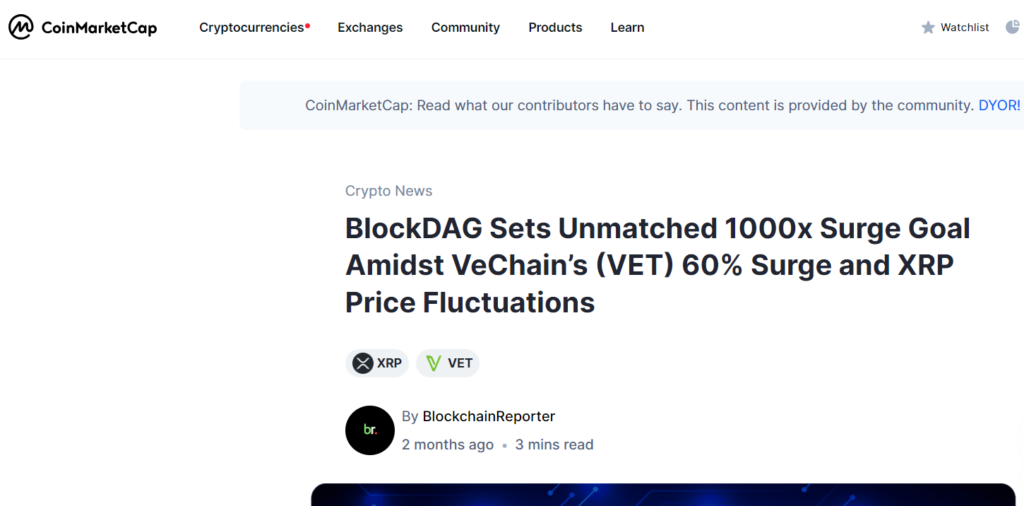
Social Media posts from those who fell for the scam
So lets take a look at some posts on Reddit from other users questioning this cryptocurrency.
Davinci Jeremie, a prominent crypto enthusiast posted this just 6 hours ago:



Phishing warnings on block explorers and Metamask
BlockDAG Network has an empty GitHub here with no submissions and no evidence of any work taking place: https://github.com/BlockDAGNetwork
The only activity is messages raised to Metamask and GetShield, asking for the warning messages to be removed when anyone connects their wallet to the website for the presale.
https://github.com/MetaMask/eth-phishing-detect/issues/28233
https://github.com/MetaMask/eth-phishing-detect/issues/57139
https://github.com/ryanjsfx2424/GetShield/issues/1
The absence of this message indicates that the request to remove the warning might have already been approved.

Their attempt to demonstrate legitimacy consisted only of social media accounts and paid news articles as evidence to refute any allegations of being a scam.
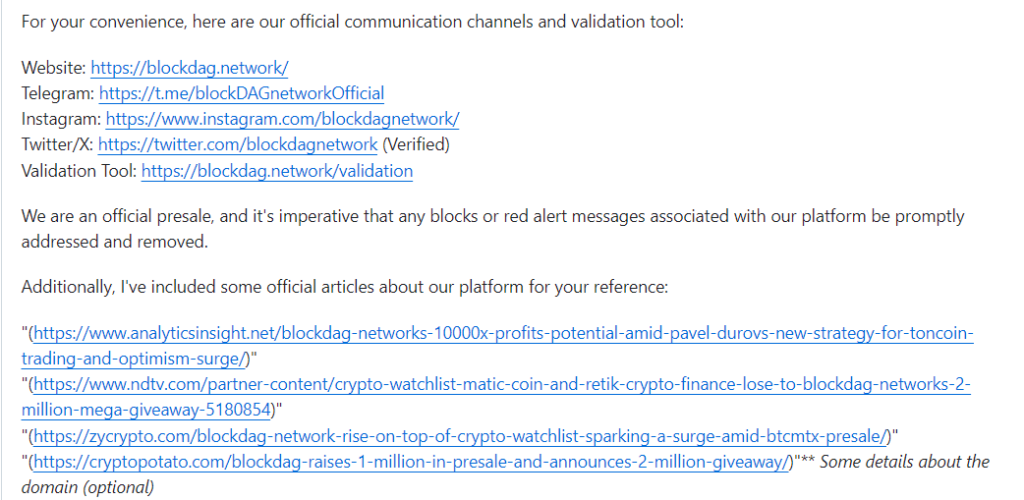
A comment on the Metamask post from another individual raising doubts about this cryptocurrency:

Upon reviewing this, one notable observation was that among the provided “official articles,” two were sourced from entities based in India. Furthermore, all of these articles were paid for and featured highly sceptical ROI claims.

The article on Analytics Insights gave us an “Insight” into the wording of the advertisements and this is where we start to see the claims becoming more wild. There are claims of 10,000x to 30,000x:
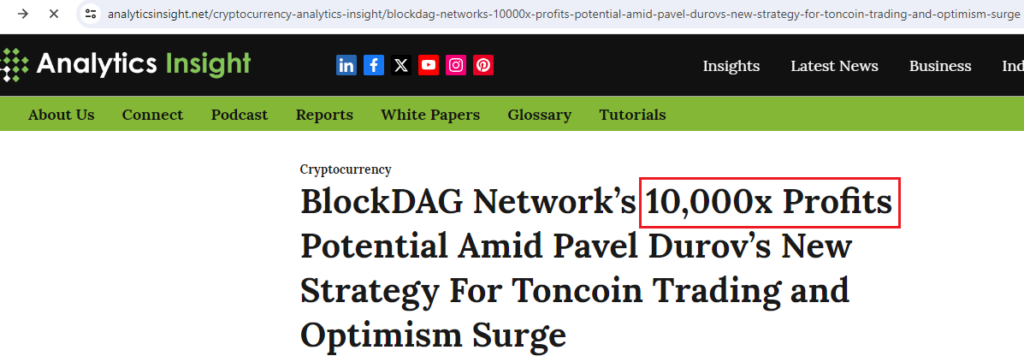
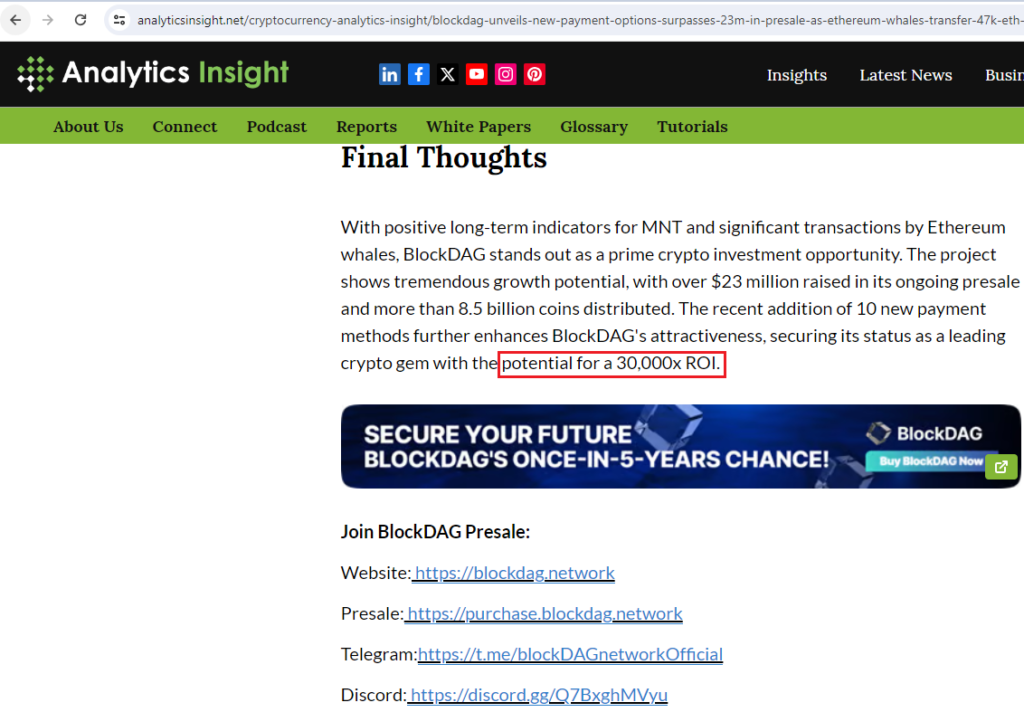
It’s implausible for any credible project to advertise a return on investment (ROI) of 10,000x, let alone 30,000x. What’s particularly striking is the presence of such false claims in an advertisement, accompanied by official URLs rather than known scam sites. Adding to this, this website was referenced as an official source in their complaint to Metamask.
Yield Reviews Team


NDTV sources articles from third-parties and has added a disclaimer at the bottom of the BlockDAG article:

From the others, one of them you can host an article for just $299:

On the other example given, ‘cryptopotato‘, the author of the article is actually ‘Chainwire’:

We found the article on the ‘Chainwire‘ website and it appears to be another paid-for article:
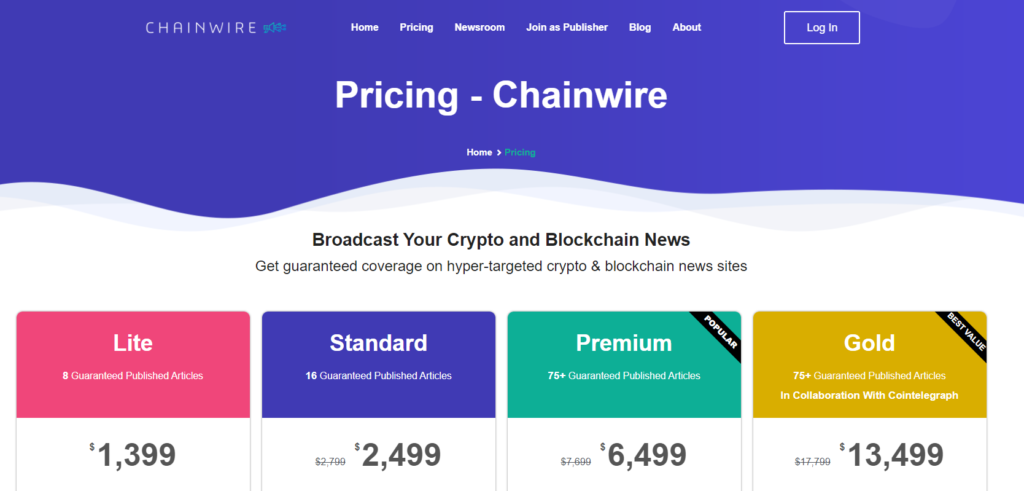
The BlockDAG YouTube Video
We were able to find the host who features in this video and he appears to be an actor called Chase Lanting from California, now based in Turkey. He has advertised a range of products such as a medical product, a mobile game and even featured in the Turkish Airlines lounge guide.

We believe that Chase may have been misled into endorsing this through paid advertisements, akin to those previously mentioned. We have reached out to him for additional clarification on the matter and will give a further update, should we receive a reply.
Website technical information is inaccurate or nonsensical
The website claims that BlockDAG is the “world’s first DAG Chain”, which simply isn’t true:

There are daily “technical “dev release” articles produced on this page:
https://blockdag.network/dev-releases
There doesn’t appear to be any real structure to these releases, they just use technical jargon from other whitepapers in a way that doesn’t make much sense. Take this example (Dev Release 2). It mentions they are researching blockDAG protocols and then proceeds to talk about Bitcoin protocol as one of those options.
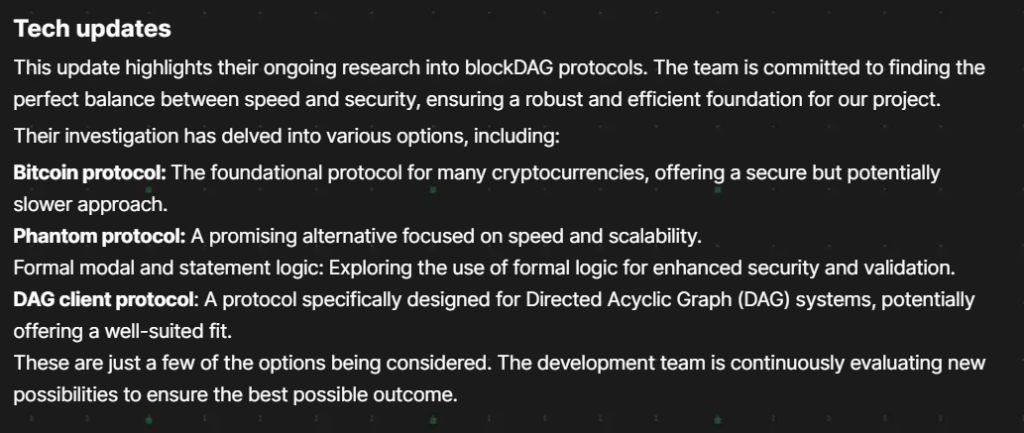
Many of the follow up “Dev Releases” are just taken from the GHOSTDAG whitepaper (a successful cryptocurrency from years ago).
You can find the GHOSTDAG Whitepaper here: https://eprint.iacr.org/2018/104.pdf
Warning – Articles by “Market Trends” and “Industry Trends”
During our research, we discovered the following accounts creating a high number of BlockDAG articles on AnalyticsInsight.net. As we believe there is a high probability that BlockDAG is a scam, there is a good chance that some of these other cryptocurrencies they post about are also scams.
https://www.analyticsinsight.net/author/industrytrends
https://www.analyticsinsight.net/author/market-trends
Additional Warning – Retik Finance
During our research into this potential scam, we found a section in the middle of an article which starts talking about “Retik Finance”. We found this to be unusual and decided to look further into this. Have scammers inadvertently confirmed another one of their scams?

On the website for Retik Finance, it shows a launch due soon:

However, searching on Google, you can see the same pattern of article spamming for this cryptocurrency. This leads us to believe that BlockDAG and Retik are potentially operated by the same scammers.

Final thoughts and summary
Navigating the landscape of potential crypto investments can be very difficult, due to the prevalence of scams. While some scams are overt, others exhibit a higher degree of sophistication. These fraudulent entities employ various tactics to camouflage themselves among legitimate projects, including:
- Creating Google ads.
- Paying third-party news sites to publish articles promoting their project.
- Engaging paid actors for endorsement through videos.
- Masquerading as a genuine project to evade phishing warnings.
- Fabricating the appearance of high transaction volumes on platforms like Telegram through the use of bots.
- Leveraging recognizable terms such as ‘BlockDAG’ to attract unsuspecting investors searching for legitimate projects.
A major issue appears to be the prevalence of paid-for articles. Distinguishing between an article that has been paid for and one independently created by a news site can be challenging for many individuals. While it may be easy to report a malicious Google advert, it is far more difficult to remove paid-for articles.


